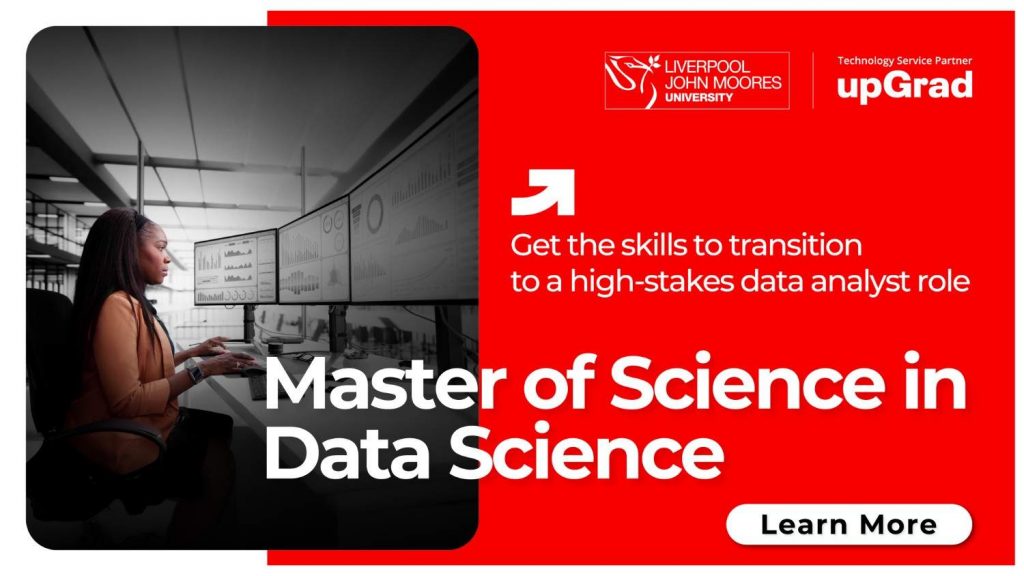Learning the basics of SQL for data science is a must if you wish to build a fulfilling career in the US. Learn SQL from scratch, including report generation, business performance tracking, and leveraging vital insights. It will help you learn how to organize and clean raw data for improved decision-making. SQL is an indispensable tool for any data scientist in the current data-driven ecosystem throughout the country.
Demand is also on the rise for data scientists, with reports indicating a 9% projected employment growth for database administrators and architects from 2023 to 2033. It is thus an opportune time to learn SQL for data science to advance your career prospects in the US.
Take your skills to the next level — Explore Data Science Program
Learn SQL for Data Science with Confidence as a Beginner in the US
Are you wondering how to learn SQL from scratch? Here is a guide to help you navigate the journey.
| Learning Stage | Key Concepts | Why It Matters for US Learners |
| Understand SQL Basics | Tables, databases, rows, and columns | Vital for querying US business, sales, and healthcare datasets |
| Writing Simple Queries | SELECT, ORDER BY, WHERE | Helps you garner valuable insights from raw data |
| Aggregation & Grouping | AVG, COUNT, GROUP BY | Vital for data summaries and reporting tasks |
| Joining Multiple Tables | INNER JOIN, LEFT JOIN | Essential for merging datasets (customers and orders) in real-world positions |
| Applying SQL in Tools | Tableau, Python, and Power BI | Standard platforms used for US data analysis and business intelligence |
Getting Started with SQL: Tools and Setup
The first step is to select a database management system (DBMS) that is specifically tailored to your project’s needs. It is the foundation of all SQL operations, and choices include MySQL (the most popular one), PostgreSQL, SQLite, SQL Server Express, and others. You’ll then have to install the DBMS by following the necessary steps and then set up your SQL IDE.
The Integrated Development Environment (IDE) comes with features such as syntax highlighting, auto-completion, and database visualization. Download and install the IDE and then link it to your MySQL server. Test your setup by running a simple query- SHOW DATABASES; If the query returns the database list without errors, then you’re good to go!
Basic SQL Syntax You Should Know
Some of the key syntax worth noting include:
- Creating Tables & Database.
- Data Manipulation.
- Filtering and Sorting with the WHERE clause.
- Integer Types- INT, TINYINT, SMALLINT, etc. (for storing whole numbers).
- Decimal Types- DOUBLE, DECIMAL, FLOAT.
- Characters- VARCHAR, CHAR, TEXT.
- Time & Date- DATETIME, TIME, DATE, TIMESTAMP.
Using SQL for Aggregations and Summaries
You can use SQL for summaries and aggregation. The latter functions undertake calculations on a set of values, returning a single one. They are used with GROUP BY clauses to segment data into various categories and perform calculations for each. Some of the key ones include:
- Count- SELECT customer_id, COUNT (id) AS total_orders FROM orders GROUP BY customer_id
- Filter group-SELECT customer_id, SUM (order_amount) AS total_spent FROM orders GROUP BY customer_id HAVING total_spent>100;
- Sum- SELECT customer_id, SUM (order_amount) AS total_spent FROM orders GROUP BY customer_id
Understanding JOINs and Combining Datasets
JOINs are operations that help combine rows from two or more tables, depending on the related column between them. They are vital for relational databases since they allow you to retrieve data spread throughout multiple tables.
You can thus present the same in a more unified manner, benefiting in the case of normalized databases where separate tables are used to store related data. This helps you avoid redundancy and enhance overall data integrity accordingly. You can also enable complex queries to extract valuable insights from various associated tables.
How SQL Integrates with Real Data Science Projects
SQL integrates with several real-world data science projects and functions. They include:
- Averages, distributions, counts, and other statistical analyses.
- Filtering, summarizing, and sorting data.
- Retrieving and manipulating data from relational databases.
- Data exploration by querying and analyzing datasets to understand patterns, relationships, structure, etc.
- Data cleaning and preprocessing, along with data integration, machine learning, and modeling.
- Managing, accessing, integrating, and analyzing big data.
Also Read: What Is Predictive Analytics and Its Role in Business Strategies?
Real-World Applications of SQL in Data Science Jobs
There are numerous applications of SQL for data science jobs. Some of them include:
- Retail: Brands and outlets use SQL to analyze sales data, predict demand, and identify the highest-selling products.
- Finance: Banks and other financial institutions leverage SQL to analyze transaction data and identify fraudulent patterns.
- Healthcare: Hospitals and treatment centers can utilize SQL for patient data analysis to identify emerging trends and enhance overall care.
- Sales and Marketing: Agencies and companies can also use SQL for evaluating campaign performance, monitoring traffic, and optimizing ad spending.
Also Read: A Hands-On Guide to Using Python for Data Analysis (US Edition)
Accelerate Your Data Science Journey with upGrad’s Program
upGrad is your best partner if you want to enroll in SQL for data science courses. Discover high-quality data science and analytics programs that equip you with core skills like SQL from top institutions. Gain hands-on learning and project experience, along with career guidance, mentorship, and access to leading US and global industry experts, as part of your learning journey with upGrad.
- Master of Science in Data Science from Liverpool John Moores University
- Executive Diploma in Data Science and AI with IIIT-B
🎓 Explore Our Top-Rated Courses in United States
Take the next step in your career with industry-relevant online courses designed for working professionals in the United States.
FAQs on Learn SQL for Data Science A Beginner’s Guide for US Learners
Q: Do I need to learn SQL before becoming a data scientist in the U.S.?
Ans: Yes, a working knowledge of SQL is required to become a data scientist in the US. Data scientists will find SQL helpful in data retrieval, access, and exploration. It also helps with building hypotheses and filtering, aggregating, and sorting data.
Q: Can I learn SQL without any coding background?
Ans: SQL is generally easier to use than many other programming languages. This is due to its simple syntax and formulas, making it suitable for beginners and those without a coding background.
Q: What’s the difference between SQL for databases vs data science?
Ans: Data science means extracting more insights and value from datasets to improve business decisions and create predictive models. On the other hand, SQL for databases is about filtering data and performing actions that are necessary for data analysis.
Q: How long does it take to learn SQL for data science?
Ans: You will need at least a few weeks to a few months to learn SQL for data science. It all depends on your aptitude, background, and the time you can devote to the course. Those with programming knowledge will require only a few weeks to master SQL, while beginners may need several months. Intermediate proficiency will take a few months, while advanced skills may require a year or even more.
Q: What are the best resources to learn SQL for data science?
Ans: While there are several online resources available, in the form of websites, forums, and other communities, you can consider taking a course to improve your career prospects. upGrad has several innovative, flexible, and affordable data science courses that teach SQL as a core skill.





















